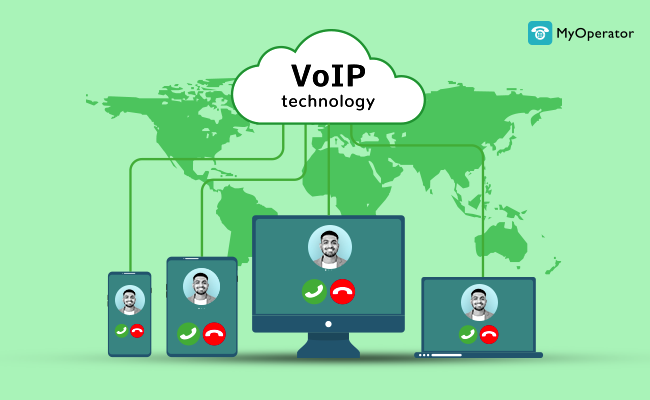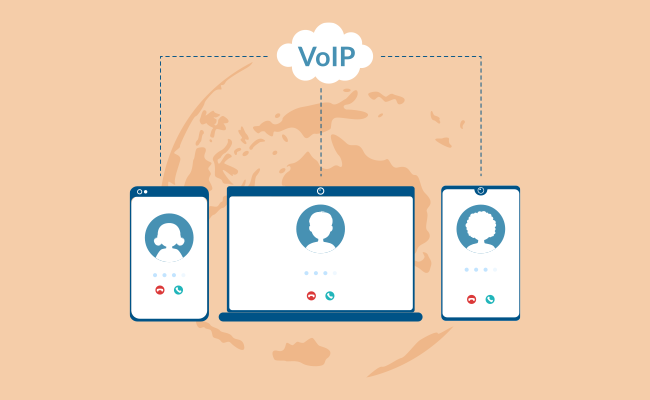VoIP phone systems have indeed transformed the landscape of corporate communications, providing state-of-the-art telecom services that cater to the needs of businesses ranging from nimble startups to expansive corporations.
The shift from traditional corporate phones to VoIP systems is not just a matter of simplicity in installation and operation but also a strategic move to adapt to evolving requirements efficiently.
In contrast, traditional systems prove cumbersome and expensive to implement, presenting challenges in scalability.
For small enterprises navigating the journey of growth, challenges are inevitable, and the natural progression often involves outgrowing existing structures.
Choosing to invest in a VoIP system is a judicious decision for startups, as it not only elevates communication standards but also leads to substantial cost savings, all while embracing the cutting-edge technology driving modern telecommunication.
You will soon encounter several roadblocks, such as deciding whether to:
- Keep your team small and effective or expand it by hiring more people.
- Stay self-funded or raise money.
- Stay within your market segment or broaden your horizons.
- Buy other startups or be bought.
It becomes imperative for companies to evolve and align themselves with advanced solutions, such as VoIP, to meet the demands of a changing landscape.
So let’s explore the intricacies of VoIP; from fundamentals to how it exemplified the traditional customer service management to proactive exchange of conversations.
What is VoIP?

VoIP, or Voice over Internet Protocol, is a technology that facilitates verbal communication through the internet, departing from conventional phone lines.
It operates by transforming analogue voice impulses into digital data packets for transmission over an IP network.
This innovative approach eliminates the necessity for expensive traditional phone lines, empowering businesses to make and receive calls (inbound + outbound calling) seamlessly through their internet connection.
Supercharge Your Call Center Efficiency
Discover Cloud Contact Center Benefits

Here’s a Step-By-Step Look at How VoIP Works
Digitization for VoIP Phone System
VoIP’s journey begins with the transformation of analog voice signals into digital data through analog-to-digital conversion. This process ensures clarity and compatibility with internet protocols, making it an ideal solution for startups and small businesses.
Packetization of VoIP Solutions
The digitized voice is intelligently divided into data packets, optimizing transmission efficiency. This segmentation facilitates smooth data flow over the internet, allowing for real-time communication, a key advantage for businesses seeking the best phone system.
Internet Transmission for VoIP Providers
Data packets embark on their journey across the internet, utilizing broadband connections to swiftly traverse the digital landscape. This reliable transmission is crucial for VoIP phone providers, ensuring seamless communication for startups and small businesses.
Routing and Switching for Best Phone System
Dynamic routing and switching mechanisms guide data packets through the most efficient paths, ensuring optimal speed and reliability. This efficiency is especially beneficial for startups looking for the best phone system to meet their communication needs.
Reassembly for VoIP Solutions for Small Business
Upon reaching their destination, the data packets are meticulously reassembled into the original voice signal through digital-to-analog conversion. This process is vital for VoIP solutions for small businesses, ensuring clear and audible communication.
Analog Playback with VoIP Phone
For users employing traditional phones, the digital signal is seamlessly transformed back into analog sound waves, delivering clear and audible communication. This adaptability makes VoIP phones a suitable choice for startups and small businesses.
Real-Time Communication with VoIP for Startups
VoIP orchestrates this entire process in real-time, enabling instantaneous voice communication. This versatility extends beyond simple calls to encompass diverse applications, from business calls to video conferencing, making it the best phone system for startups.
How VoIP Boosts Business Customer Service

The integration of VoIP services elevates business customer service through:
- Enhanced Connectivity: VoIP ensures uninterrupted communication, enabling businesses to stay seamlessly connected with customers.
- Scalability: Businesses can easily scale their communication infrastructure to meet growing customer service demands.
- Cost Efficiency: VoIP eliminates the need for traditional phone lines, reducing communication costs for businesses.
- Feature-rich Solutions: VoIP offers advanced features like call forwarding, voicemail-to-email, and auto-attendants, enhancing customer interactions.
By merging the efficiency of the internet with advanced communication capabilities, VoIP revolutionizes business interactions, fostering enhanced customer service experiences.
So, In What Way Can A VoIP System Fulfill The Needs Of Startups?
A VoIP (Voice over Internet Protocol) system proves highly advantageous for startups, catering to their needs in several key ways.
Primarily, it offers cost-effective communication options, making it the best phone system for startups.
Unlike traditional on-premise phone systems, which can be expensive to establish and maintain, VoIP eliminates the need for dedicated phone lines and reduces long-distance or international calling rates.
This cost efficiency is particularly beneficial for startups with limited financial resources, allowing them to allocate funds to other areas of expansion and improvement.
Additionally, VoIP systems enhance mobility and flexibility, a crucial aspect for small businesses, especially those with remote or mobile workforces.

The ability to place and receive calls from any location with an internet connection ensures continuous communication for mobile workers and remote employees.
Features such as call forwarding & call transfer and mobile access to office extensions, along with reliable voip phone providers, contribute to uninterrupted collaboration, resulting in increased efficiency and productivity.
Modern VoIP systems come equipped with a ocean of functions, including:
Video Conferences:
- Conduct virtual meetings and discussions seamlessly.
Smart Call Management:
- Efficiently handle and organize incoming calls.
Alerts and Notifications:
- Stay informed about important calls and messages.
Rejection of Anonymous Calls:
- Enhance security and filter out unwanted calls.
Text Messaging:
- Send and receive text messages for quick communication.
Voice Calls and Voicemails:
- Manage voice calls and access voicemails easily.
Call Rating, Screening, and Recording:
- Evaluate calls, screen incoming calls, and record conversations.
Speed Dial, Auto-Attendant, and VoIP Caller ID:
- Simplify dialing, automate call routing, and identify incoming calls.
Interactive Voice Response (IVR):
- Streamline customer interactions with automated voice menus.
Do Not Disturb (DND):
- Control interruptions and maintain focus when needed.
Reporting and Analytics for Calls:
- Access insights and data to enhance call management.
This comprehensive feature set further elevates the communication capabilities of startups, offering them an enhanced and versatile platform for seamless business operations.
Exploring VoIP Options: Types of VoIP Services

Curious about setting up VoIP? Let’s delve into the available types of VoIP services:
VoIP On-Premises
- Operates similarly to traditional landlines but utilizes the internet for making and receiving calls.
- Involves setting up Private Branch Exchange (PBX) hardware within your company’s premises.
- PBX serves as the company phone system, managing both inbound and outbound lines along with additional call management tools.
- Your responsibility includes system upkeep, updates, security and privacy protocols, and operational control.
- Requires a significant upfront payment and a minimum monthly fee to facilitate the phone connection.
Cloud-Hosted VoIP
- PBX equipment is hosted directly by cloud-based VoIP systems, known as cloud PBX solutions.
- Businesses using this service connect their configured IP telephones to their Local Area Network (LAN).
- Offers the advantage of the phone supplier handling system maintenance and upgrades.
- Involves minimal monthly charges per user, eliminating any upfront costs typically associated with traditional setups.
How are startups using VoIP to scale up quickly?
Let’s discover why VoIP is better:
1. Virtual assistance for customers.
VoIP is being used by startups to create virtual customer service centres.
Startups can offer round-the-clock customer assistance to a global customer base.
It can be done by deploying VoIP systems and remote customer service agents, assuring high customer satisfaction levels, and extending their market reach.
2. Extension to other countries
Without having actual offices, VoIP enables firms to develop a local presence in several locations.
Startups can establish a local presence by acquiring local virtual phone numbers in India, making it simple for customers to contact them.
For entrepreneurs aiming to grow their businesses internationally, this approach has been effective.
3. Collaboration at its best
VoIP is being used by startups with remote teams to promote seamless communication.
Teams may efficiently work regardless of their physical locations using tools like conference calling and video conferencing.
This improves collaboration, increases output, and promotes the expansion of businesses.
How to Choose a VoIP Provider: An In-Depth Guide

Selecting the optimal VoIP service provider is a critical decision requiring a profound understanding of your business needs and a meticulous evaluation of various factors. Here’s an insightful, step-by-step guide to guide you through this essential process:
1. Define Your Business Needs
- Begin by meticulously identifying your communication requirements. Consider the number of users, specific features essential for your operations, and the scalability necessary to accommodate your business growth.
2. Evaluate Pricing
- Striking the right balance between cost and features is paramount. While free services like Skype and Microsoft Teams are suitable for personal use, for business needs, opt for paid services. Priced per user, these services offer enhanced features. Pay attention to setup costs, ongoing maintenance, and any potential additional charges. Click here to get VoIP for FREE (limited offer)
3. Assess Call Quality and Reliability
- Prioritize providers that excel in both call quality and reliability. Some providers emphasize call quality, while others prioritize speed. Look for providers offering trial periods, allowing you to assess whether their priorities align with your business requirements.
4. Check Reliability Measures
- Investigate the provider’s measures for handling disasters or outages. Look for a provider with 24/7 customer support and redundant data centers, ensuring uninterrupted service. MyOperator stands out in this regard, providing robust backup plans for added reliability.
5. Consider Ease of Setup
- Opt for a provider with a user-friendly setup process. MyOperator an IVR service provider, for example, ensures immediate VoIP activation and offers self-setup options. Consider softphone apps for immediate call capabilities, and assess whether the provider’s setup aligns with your team’s technical proficiency.
6. Review Customer Feedback
- Delve into customer reviews on online platforms, social media, and comparison sites. MyOperator’s positive feedback from business owners offers valuable insights into the provider’s reliability, service quality, and customer support.
7. Explore Scalability and Flexibility
- Anticipate your business’s future growth. MyOperator offers scalable solutions, making it seamless to accommodate an expanding user base or additional functionalities. Evaluate whether the provider’s scalability aligns with your long-term business goals.
8. Check Integration Capabilities
- Assess how well new VoIP solutions, especially those offered by MyOperator, integrate with your existing software and tools. A seamless integration ensures smooth operations and enhances overall efficiency.
By meticulously considering these factors, you can confidently choose MyOperator as your VoIP service provider, ensuring a tailored fit for your business needs and fostering effective and reliable communication solutions.
Advantages of VoIP for Businesses
The cost of maintaining effective communication poses a significant challenge for small businesses, especially when striving to expand their customer base within limited resources.
VoIP addresses these challenges and offers several key benefits for small enterprises:
1. Reduced Maintenance Burden
- Traditional phone systems entail complex maintenance tasks, from setting up phone lines to regular upgrades and replacements.
- VoIP systems simplify operations, saving costs on equipment upgrades, repairs, and maintenance contracts.
- Remote maintenance and troubleshooting capabilities eliminate the need for on-site visits, reducing downtime.
Drive Results with Efficient Campaign Management

2. Mobile and Adaptable
- VoIP liberates startups from the constraints of traditional phone networks, allowing workers to make and receive calls from anywhere with an internet connection.
- Accessibility via various devices, such as laptops, cell phones, or IP desk phones, enhances flexibility and convenience.
- VoIP phone providers offer local number mobility, ensuring a consistent, reachable number for seamless communication.
3. Increased Productivity with VoIP Solutions
- VoIP services offer a range of features, such as sequential dialing and interactive voice response, automating tasks and improving employee productivity.
- Advanced functionalities streamline workflow and free up staff time for more meaningful work, crucial for small firms with limited resources.

4. Portable VoIP Technology for Startups
- VoIP systems offer portability, allowing the seamless movement of the telephone system.
- Users can work remotely, accessing the company’s communication systems from any location with internet connectivity.
- This flexibility enables efficient remote operations, ensuring constant connectivity and communication even outside the physical headquarters.

5. Enhanced Capabilities and Integration with VoIP Phone System
- VoIP provides modern communication applications, including call forwarding, voicemail-to-email transcription, call recording, and virtual phone lines.
- Integration with other corporate systems and apps, such as CRM software, enhances productivity and operational efficiency.
In summary, VoIP technology, particularly tailored as VoIP solutions for small businesses and startups, serves as a flexible, feature-rich, and cost-effective communication solution.
By leveraging VoIP, small businesses can extend their reach, optimize operations, and enhance customer experiences, contributing to accelerated growth and success in the dynamic business landscape.


